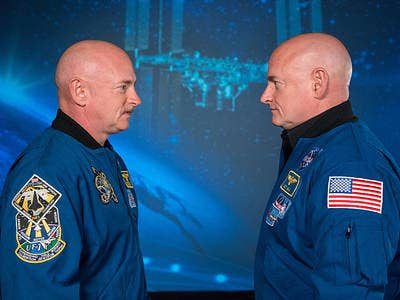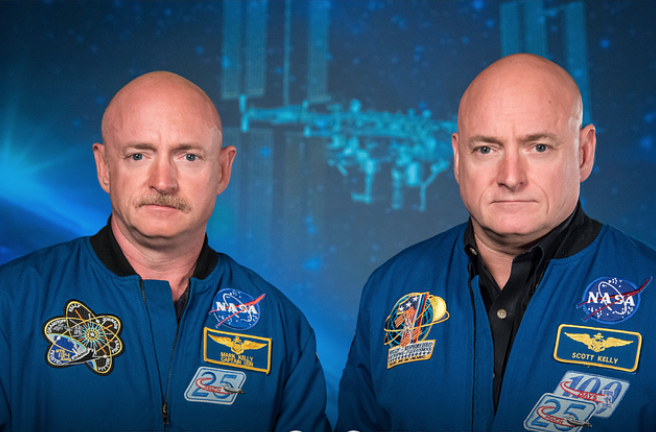
A NASA news release touting altered “space genes” in a study of identical twin astronauts Scott and Mark Kelly triggered surprise — even from the astronauts themselves.
What? My DNA changed by 7%! Who knew? I just learned about it in this article. This could be good news! I no longer have to call @ShuttleCDRKelly my identical twin brother anymore. https://t.co/6idMFtu7l5
“New ‘space genes’ were reported,” a NASA summary said in January, describing the experiment, which looks at the biological differences between the two astronauts after Scott spent a year aboard the International Space Station, ending in 2016, while Mark stayed earthbound.
Preliminary results from the study were released at a NASA Human Research Program workshop in January but were picked up by news outlets only in the last week, triggering a flurry of space mutant jokes and misleading headlines.
Takeaway from this story: if you really don't like being an identical twin, spend some time in space. (Also, where can I get myself some "space genes", because that just sounds cool.) https://t.co/M9fMOABbFP
The lead scientist of the study, Christopher Mason of Weill Cornell Medicine, told BuzzFeed News that news coverage suggesting that Scott Kelly is a space mutant and no longer an identical twin of Mark Kelly is a bit confused. Scott’s DNA code did not change, he said. But going to space did affect the way his genes were turned on and off — known as gene expression.
“It was the gene expression that changed,” Mason said by email. “Whereas many of the people are talking about DNA changing are slightly misstating that.”
Everyone has about 20,000 genes in each cell, and the way the genes are turned on or off help the cell make the proteins and other stuff the body needs to function. Lots of environmental factors are known to change the expression of our genes. For Scott Kelly, his space trip seemed to do just that.
“Although 93% of genes’ expression returned to normal postflight, a subset of several hundred ‘space genes’ were still disrupted after return to Earth,” the space agency announced.
But those space genes are still the same genes that Kelly possessed all along; they just are expressed more or less often. Largely the genes are connected to the immune system, DNA repair, bone formation, and metabolism, according to Mason, whose team is still waiting for the formal publication of their findings.
“First off, what one can certainly say is that changes in gene expression are not ‘permanent changes to DNA’ as some outlets appear to be reporting,” genetics expert Sarah Marzi of Queen Mary University of London told BuzzFeed News by email. She cautioned that with such a low number of participants in the study — two astronauts — a lot of the reported gene differences could be spurious. And the NASA news release doesn’t explain how big the difference in gene expression is between the twins, which would help tell researchers if they mattered.
“As for the term ‘space genes,’ it is certainly catchy but equally exaggerated,” Marzi said.
Nevertheless she called study unique and intriguing: “It's fantastic that they were able to recruit identical twins for the study.”

“This gives us the first glimpse of the molecular catalog of human genes that are resilient or sensitive to the changes and stresses of year-long spaceflight,” Mason said. Seeing perhaps 7% of genes still disrupted after being back on Earth is neither a high or low number, since the research team had no idea what to expect.
“This is the first experiment of its kind, so this sets the bar for future studies of astronaut health,” Mason said. “That being said, this number is within a reasonable change range for humans under stress.”
NASA's Kelly Humphries of Johnson Space Center sent an agency statement to BuzzFeed News late on Thursday:
"Mark and Scott Kelly are still identical twins; Scott’s DNA did not fundamentally change," the statement says.
"We are at the beginning of our understanding of how space flight affects the molecular level of the human body. NASA and the other researchers collaborating on these studies expect to announce more comprehensive results on the twins studies this summer."
Fans of space mutants still can have a little hope until then. The team is seeing small signs of a few genuine DNA mutations in Scott Kelly, Mason said, which are still under study. And along with another research group, they have seen signs that the end caps on his chromosomes — called telomeres — may have gotten longer during spaceflight.
In the meantime, the genetics team is enjoying the attention, Mason said. “It is fun — just wait until all the papers come out!”
UPDATE
This post has been updated with comment from NASA's Johnson Space Center.

